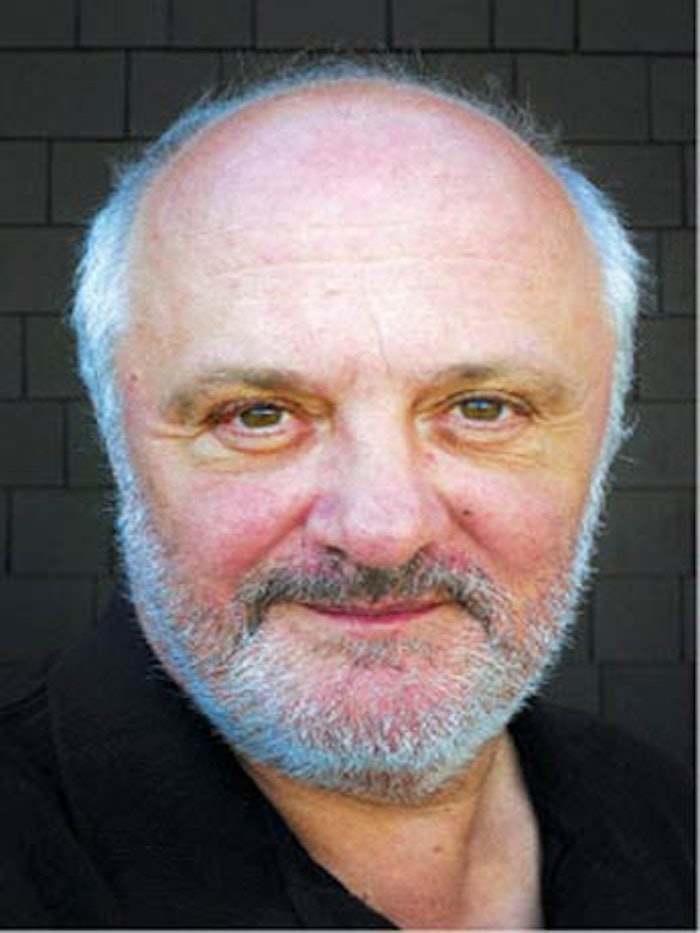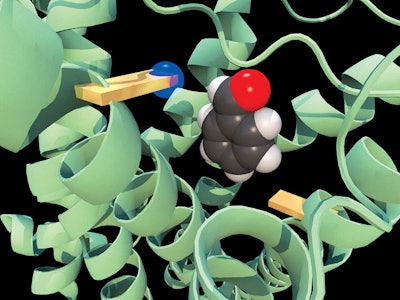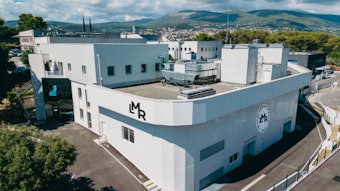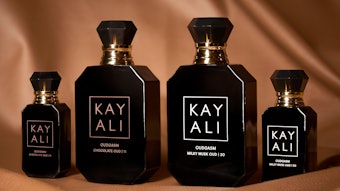
We’re sitting in Calice Becker’s office on Avenue Kléber. Her desk is covered with dozens of modifications of her latest work and surrounded by shelves decorated with rows of giant factices of some of her most famous wins: J’adore Dior, Beyond Paradise, Lola, ByKilian Collection...
“Oh, Luca – he’s such an intelligent and charming man,” Calice said, smiling. Luca is a fan of hers and it looks like the feeling is mutual. “My gut feeling...I am not a scientist but predicting the smell of a molecule by its vibration inspires me. Vibration could be it. I’d like that.”
Later that day I am having lunch with the students at Givaudan perfume school, class of 2016: the lucky handful who have been chosen from the hundreds of hopefuls. Dana Schmitt, a young American, is just coming to the end of her eight-month trial period and will soon be smell-tested on the 500 ingredients students have to memorize. In-between mouthfuls of salad and pasta from the canteen, I ask her, “What made you want to become a perfumer?” She answers without missing a beat: “Luca Turin. It was the A-Z guide. That’s what got me obsessed.”
I devoured that book, too. It gave me such pleasure to see someone writing about smell the way Luca does. I became an instant fan of his turn of phrase, his passion for the subject and his humor. I’m not alone. There are thousands of people for whom Luca did to perfume appreciation what Chanel No.5 did to aldehydes.
Lisa (Wordbird) Jones is a copywriter and a perfumista. In her blog, she describes the exact moment she fell for perfume: “Turin claims Mitsouko is the perfume he would take with him if he was being sent off on an intergalactic space mission. He describes this peach chypre as lovingly as if it was his favorite child. I had to smell it. Being in France meant that I could spend hours in a handy branch of Marionnaud, smelling many of the amazing things he described in glowing terms usually reserved for works of art.”
Let’s be clear: Luca Turin is an influential man in the world of fragrance. His charm, wit and writing has reached and inspired many. He is also probably personally responsible for more perfume sales than the annual takings of all Parisian perfumeries combined.
But is he right about smell?
The Awkward Question
I meet Luca in London, on the evening before his Royal Society of Chemistry lecture about new research that appears to corroborate the vibration theory of smell. I tell him, “I’m trying to get my head around some of the arguments against your theory.”
He grins. “They’re over. We’re winning. I could easily have been completely wrong. As it turns out, I wasn’t. So it’s not a given, but it’s fast becoming a fact.”
Luca has become adept at explaining the basics of our sense of smell to audiences from mixed backgrounds. When I attend his lecture the day after, I can’t help but think that he would have made a great science communicator. His lucid use of metaphor and humor help make a complex topic comprehensible to just about anyone.
The focus when talking about Luca’s scientific work is always on the differences between the established majority consensus versus the controversial theory of vibration—but in reality everything that he proposes is either standard biochemistry or well-known, 50-year old mainstream quantum physics—it’s just that the two have never been mixed before. He wasn’t even sure of vibration himself, until he discovered that inelastic electron tunnelling could be a plausible biological mechanism for it; and during his lecture, he pokes fun at the idea of a clunky spectroscope up our noses. It’s at the point of homing in on how smell is written into molecules that the difficult-to-answer questions start.
“There are plenty of mysteries in all of the senses,” said Luca, “it’s not like we understand vision and hearing perfectly, but in olfaction, in my mind, the greatest mystery is: ‘How is odor written into a molecule?’ What is it that the receptors feel? That is the whole story of the last twenty years of my scientific life.”
I, like so many fans of Luca, want to understand his work in science not just in perfume writing. “I’m not a scientist,”
I start—the standard disclaimer trying to pre-empt any howlers that might follow—“but to me it feels like there could be multiple things going on. Is that possible?”
Luca is used to this question. “Yes, there could, definitely. The question is: Are the effects big enough to account for what we’re seeing?
“Until now there were really two kinds of evidence in favor of the vibration theory—apart from the negative evidence which is that shape doesn’t explain a damn thing.
“One is sensory evidence—for example, the fact that all molecules which contain a hydrogen and a sulphur atom smell similar. The second is behavioral evidence from flies—getting them to avoid certain vibrations1,” Turin explained. “Unfortunately, in the field of smell people don’t seem to trust their own senses. If you hand out smelling strips, people giggle. If you showed them a visual illusion, they’d be fascinated.”
The Problem With Science
I have read books by Charles Sell and attended his lecture on olfaction, too. Everything he said seemed convincing. It’s hard for a layperson to make sense of this, so I ask Luca, “Does it ever feel that despite the aim of science to be a neutral method, you inevitably end up taking sides?”
“It’s a very complex equation—and the majority of people are fairly open-minded and do not hold any particularly strong opinions. They’d love to know the answer, but they are not going to figure it out themselves and are content to wait until they can read about it in Nature. And then there are a few people who actually read scientific papers and make their own conclusions. And finally, a type that seems to be wedded to a particular idea for no obvious reason. I’ve never quite understood that.” Luca considers for a while and approaches the question differently:
“Two kinds of people go into science: the ones who are looking for certainty and the ones who are looking for uncertainty. These two tribes are at odds on a fundamental level. If you find dogma reassuring, you go into science. If you find dogma oppressing and irritating, you go into science. How are these two people supposed to get on?”
I ask Luca what the most frustrating thing about his research is.
“Time,” he answered without hesitation, “even with everything being perfectly reasonable and normal, time constraints are the biggest problem. Let’s assume I’m right about smell. Even under such favorable circumstances, the time it takes to convert half the people to your idea is the length of your professional life. So the problem with science is death. If I lived infinitely long, I wouldn’t care, but I’m 62. I care. Who was it that said ‘at my age, I don’t even buy green bananas’? There’s a green bananas problem in science.”
“You had your Ph.D. when you were 25, and it took a while before you stumbled on the vibration theory of smell,” I interjected.
“That’s right. If you happen to have your idea when you’re 20, you can probably live with that. My first paper on smell2 was published when I was 43. As a matter of fact, the statistics on big experimental science discoveries suggest that the peak is around 40 years of age. But then it’s a race against time. Bits start falling off. Hubcaps. Exhaust.” Luca laughed.
“There’s another problem, though,” he continued – serious again, “science is at risk of becoming a cult. The assessment of science by your peers is essentially a gigantic conflict of interest because for someone to be able to judge your work, they must be working in the same field. There are attempts to mitigate this, but the person who knows enough science to judge and hasn’t got a personal interest in the results turning out one way or another has become vanishingly rare.”
I’ve Got a Theory
Dr. Turin was born in Beirut, Lebanon to an Italian-Argentinian family and has since lived in several countries—the U.K., U.S., France, Germany and Greece. He earned his Ph.D. in biophysics from University College London in 1978, and has worked as a lecturer, award-winning fragrance writer and a fragrance molecule designer. You only have to read a paragraph or two of his perfume guide (the first of which was Parfums, Le Guide, published in French in 1992) or his Duftnote columns (recently out as an English-language e-book Folio Columns 2003-2014) to get a sense of a person with both broad and deep understanding of multiple subjects and a kind of world citizen approach to culture.
“My parents grew up in Argentina—the only place in the world where European culture as a whole was present in the book stores. Everything was in translation, so if you were an Argentinian intellectual, you were reading French, Italian, German, Spanish and Scandinavian works. I was brought up on very much a New World view of Europe as a continent, not as a set of countries,” he said.
It was his cross-field reading and insatiable curiosity that made Luca pay attention to a theory that had been discarded as highly implausible. His increasing interest in perfumes and olfaction generated many questions which didn’t yield satisfactory answers. So what is a scientist to do, but to dig deeper? And so he did.
The vibration theory of olfaction has been moved along by Turin and the research teams he has been working with since it was first proposed in the late 1920s by Malcolm Dyson and expanded by Robert H. Wright in the 1960s. The first problem was to come up with a plausible mechanism, but Luca is now convinced that a combination of inelastic electron tunnelling and quantum mechanics could be the answer. There have been several experiments and studies since Luca published his first paper on the theory in the 1990s and the rather promising results of the most recent experiments on honeybees were published3 shortly after his London lecture in March 2016.
A paper by Block et al, published in PNAS4 and titled Implausibility of the Vibrational Theory of Olfaction, is dismissed by Luca as bad science even though he clearly has much respect for the scientists behind it:
“Block is the greatest sulphur chemist of all time—he’s the guy who discovered why onions make you cry. His paper was an early attempt at dealing with cells—they’re using olfactory receptors from humans put in a kidney cell in the wrong cells, so the results are unreliable, by their own reckoning. And a negative result is a negative result. There’s a million ways you can get an experiment not to work.”
Luca’s team responded with a paper called The Plausibility of the Vibrational Theory of Olfaction5 in which questions are raised about the methods of Block’s team. Luca insists that the musk samples they were handling ought to have smelled different from one another.
“The work we’ve done recently,” said Luca, “shows that the cells in real, live animals respond completely differently to isotopes. They also made an error by refusing to answer a simple question about whether their samples of musk smelled different despite claiming that they had musks of far higher purity than our team. It was quite strange to claim the purest prep, not mention the smell of what you were testing in a paper about olfaction!”
This year’s research on bee brains may not be the definitive proof Luca needs to say “I told you so,” but the results of his team’s work do lead to questions that the shape theory of olfaction alone can’t answer. Those questions are getting harder to ignore.
A Mischievous Visionary
Luca has started reviewing fragrances again. News of his blog, Perfumes I Lovea, spread like wildfire across perfume communities all over the world. This time he is focusing on indie and niche brands, only writing about the scents he likes. While a witty put-down of a big fashion brand’s latest release might not have a negative impact on sales, panning by the world’s most famous perfume critic could potentially destroy a fledgling start-up. As disappointing as that may be to the audience who enjoyed the mischievousness of his one star reviews, it’s the right thing to do.
The blog is exuberant, literary and full of joy for the topic. He writes mini-essays about perfume— often setting the scene rather than describing smells directly:
“Legend has it that when the young Belgian composer Guillaume Lekeu finally heard the first chord of Tristan and Isolde at the Paris premiere of Wagner’s opera, he promptly fainted and had to be carried out on a stretcher, thereby missing the rest. Only a robust constitution saved me from doing the same when I first smelled Miyako.”
In his book, The Secret of Scent, Luca wrote: “In science, there are three kinds of problem: the ones only specialists care about (99% of the total), the ones everyone cares about (cancer, the next flu vaccine, a better antimalarial, etc.) and a third, most mysterious category: the questions everyone would like answered but nobody dares ask. [...]I told my friend Walter Stewart about this, and his comment has remained with me ever since. He said there were three kinds of answers corresponding to the three kinds of questions I listed above. Those that are boring if true (99%), those that are interesting if true (cancer, etc.) and the last category, which he characteristically put above all others, of things which are interesting even if not true.”
Is Luca right about smell? Maybe that doesn’t matter. But one thing is certain; he is making the world of fragrance more interesting.











